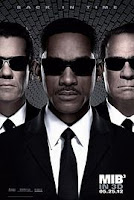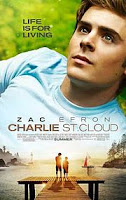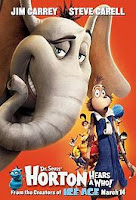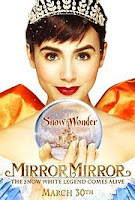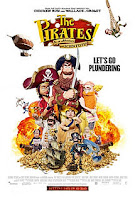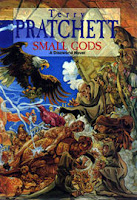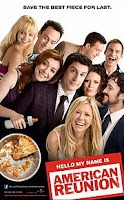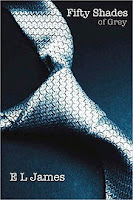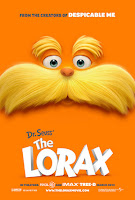Director: Barry Sonnenfeld
Genre: Action, Comedy, Sci-Fi
Rating: B-
This was another one of those films that surprised me. I went in with really low expectations – I
didn’t even want to see it (I made a hard fight to see Dark Shadows instead, but we ended up arriving at the theatre after
it had started). Yet, despite the fact
that I didn’t really want to see it and had very low expectations for it, I was
pleasantly surprised by Men in Black 3,
although perhaps this was in part the result of my low expectations.
At the start of the film Agents K (Jones) and L (Smith) have been
working together for fourteen years
(paying no attention to the fact that in the five year gap between MIB and MIB2 K was retired and had no memories of the MIB), although they
still have secrets between them. J
continually nags at K to reveal more of his past to him, with K very much
ignoring him in a manner that you would very much expect of Tommy Lee
Jones. That all changes when alien Boris
the Animal (Clement) travels back in time and kills K on July 16, 1969. It is up to J to travel back in time and work
with a young K (Brolin) and alien Griffin (Stuhbarg), who sees all possible
futures, in order to ensure that the future that happens is the one that J
knows.
Let’s start with the easy stuff and work our way to the more
complicated bits. The comedy in MIB3 was great. Jones and Brolin both make a good straight man
to Smith’s funny man. Thompson was
hilarious, proving yet again that you cannot go wrong casting her in a movie
(seriously, has she been in any bad movies? Any?). I was a bit disappointed that some of the
comic relief aliens from the earlier films played a much smaller role in this
one, and that Frank the pug wasn’t shown at all. The casting in general, though, was
great. As already mentioned, Emma
Thompson was amazing. Brolin really
surprised me as well, the way in which he played a younger version of Jones was
incredible. They even sounded alike; at
one point I wondered if Jones had done a voice over for Brolin’s part. The character of Griffin was absolutely
adorable and nicely done.
Now, on to the big stuff: The time
travel aspect of the film was handled really well, although there were a few plot
holes, especially in regards to just how J is recruited in the first place of K
died in 1969. I also really disliked how
little reference they made to the fact that Smith is black and travelling to
1969. There are a couple comments about
it, but for the most part the problems that he’d face are ignored. Likewise, Mike Colter is cast as a colonel
working at NASA when there is no way in hell that would have happened in
1969. It’s almost as if the film wanted
to, pardon the expression, white wash American history while pretending to pay
lip service to it. The one really big
problem with this film is just how much it ignores story established in MIB2.
While the second film in the series really wasn’t good, it almost seems
like the directors and producers decided to ignore its existence (which is a
bit ridiculous, given as it’s the same people who did the first two films). Oh, on a concluding note, as awesome as Thompson was, I did have to question the decision to cast her as a romantic interest of sorts, and long time colleague of Jones. Not only is there a bit of an age difference between the two (15 years), but he looks a fair bit older than he is and she looks a bit younger than she is, making it a bit weird. The romantic interest of sorts is one thing, the long term colleague (Thompson's character, Agent O, is portrayed in 1969), another.

